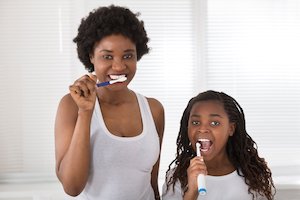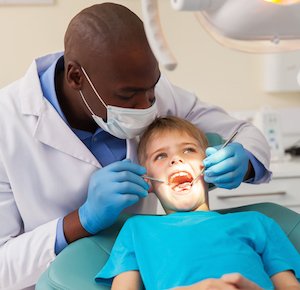Looking for methods of teeth whitening for kids? If your kid just got their braces off or they have yellow, stained teeth that you want to get rid of, Dentaly.org has solutions for you.
In this article you’ll learn the answers to the following questions:
- What causes yellow teeth?
- How does teeth whitening work?
- Is teeth whitening safe for children?
- What is the recommended age for teeth whitening in children?
- What are the effects of teeth whitener for kids?
- What are ways to whiten kids teeth?
- How can my child maintain good oral hygiene?
By answering these questions Dentaly.org hopes to give you all the knowledge you need before attempting to whiten your kid’s teeth on your own.
What causes yellow teeth?
Our teeth aren’t intended to be pearly white. The enamel of our teeth is a blueish-white tint, but due to its translucency, the yellow color of the dentin beneath can be seen. Because the enamel on our teeth thins as we age, it’s natural for teeth to darken or yellow over time.

Top causes for teeth discoloration in children
There are many possible causes of teeth discoloration in children:
- Poor dental hygiene habits
- Pigmentation due to foods and beverage stains
- Intake of medications that contain iron (vitamin supplements)
- Nerve damage or tooth trauma
- Excessive fluoride due to use of infant formula combined with fluoridated water
- Tooth decay
- Mother took tetracycline while pregnant or breastfeeding
- Medical conditions that hinder teeth development during infancy
- Decalcification of enamel due to the removal of braces
How does teeth whitening work?
The whitening agent is usually carbamide peroxide or hydrogen peroxide-based and penetrates the enamel to reach the discolored molecules inside your tooth. Oxygen molecules from the whitening agent react with the discolored molecules in your teeth, breaking the bonds that hold them together.
Is teeth whitening safe for children?

Yes, but only in certain circumstances. Children who still have any baby teeth should not have their teeth whitened. Children who meet the following criteria can have their teeth whitened:
- All of their permanent teeth have erupted.
- The enamel on the permanent teeth of the child has already calcified completely.
- All orthodontic procedures have been completed.
- Although tooth whitening is generally considered safe for kids, there are some potential dangers involved. Many tooth whitening strips, for example, contain a high quantity of hydrogen peroxide. When used in high doses, it can help whiten teeth, but it can also induce dental sensitivity. The same thing can happen to adults.
What is the recommended age for teeth whitening in children?
It all depends on the condition of the child’s teeth, but many dentists consider age 14 as the most appropriate to start the process because permanent teeth typically form after 13 years. After this age, it’s safer and more comfortable to whiten teeth.
What are the effects of teeth whitener for kids?
Tooth sensitivity
In children, teeth whitening treatments can cause sensitivity. Because children’s teeth are still developing, the bleaching chemicals penetrate beneath the enamel to reach the nerves. When they eat meals or drink fluids, they may endure some discomfort.
The sensitivity is typically temporary, lasting a few days or weeks. Children may experience a loss of appetite, discomfort, and pain.
Bleached gums
Bleached gums can result from improper teeth whitening methods. Some bleaching chemicals are not safe for kids to use. Instead of solving the problem, certain bleaches can make it worse.
Doctors advise against using products that contain more than 0.1% hydrogen peroxide. A product with a high concentration of this chemical can be harmful, and hydrogen peroxide can cause permanent bleaching in extreme cases.
Gingival irritation after bleaching
Gingival irritations can be uncomfortable for children. After bleaching, one out of every two or three patients has had irritation. Hydrogen peroxide is used in several teeth bleaching products. Hydrogen peroxide can be harmful to dental organs depending on the frequency and duration of exposure.
Ways to whiten kids’ teeth

Professional whitening
Dental bleaching is a type of cosmetic dentistry that involves the use of carbamide peroxide or hydrogen peroxide to whiten teeth.
Although tooth whitening kits are available in stores and pharmacies, the American Academy of Pediatric Dentistry recommends that parents speak with their pediatric dentist before bleaching their child’s teeth.
Parents trust professional teeth whitening because:
- The whitening procedure is overseen by a pediatric dentist.
- Dental professionals make trays that suit your child’s mouth perfectly (not one-size-fits-all).
- It gives you whiter, longer-lasting results than store-bought whitening.
- It gets rid of surface stains as well as deep, difficult stains.
- It greatly reduces the likelihood of dental sensitivity and gum discomfort.
Whitening products
Using whitening toothpaste for kids, you can get rid of stains on your teeth’s surface. It usually contains mild abrasives that polish teeth and has chemicals that break down or dissolve tooth stains.
In other words, whitening toothpaste will eliminate minor stains from your child’s teeth, but it will not completely whiten them.
Kids whitening toothpaste can cause teeth to become sensitive to cold or hot because of the tiny holes in tooth enamel that may become exposed from the abrasives.
Consult your child’s pediatric dentist before allowing them to use whitening toothpaste. Many pediatric dentists would advise you to wait until your child has learned proper brushing habits.
Alternatives to teeth whitening treatments in children
Natural teeth whitening for kids
1. Brush with baking soda
Baking soda is a popular tooth whitening treatment for people of all ages. It’s important to keep in mind that baking soda will not whiten your child’s teeth in a single day. For best results, strongly encourage your kid to brush his or her teeth with baking soda on a routine basis.
To make a paste, mix two tablespoons of water with one teaspoon of baking soda. Your child does not need to brush with baking soda every day. They can brush their teeth with the paste two or three times per week.
2. Eating vegetables and fruits
Teeth yellowing in children can be treated by eating fruits and vegetables, according to several studies. Also, your child’s teeth will be stronger and healthier if he or she eats fruits and vegetables. Several fruits can aid in the removal of stains and plaque as they chew. Pineapple and strawberries have been proven to help treat discolored teeth in children.
3. Lemon baking soda mix

When you combine lemon and baking soda, you get a paste that can help your child’s teeth discoloration. After applying the paste to the teeth, your child should wait at least two minutes before rinsing it away. Don’t do this more than once every 1-2 weeks. Lemon is acidic, which can erode tooth enamel if used too much.
Prevent staining through maintaining good oral hygiene
- Brushing teeth twice a day. Make sure your child brushes their teeth twice a day. The most important time to brush your teeth is at night. Don’t skip this one!
- Cleaning between teeth once a day with floss or a waterpik.
- Visit the dentist twice a year for regular dental cleanings.
Conclusion
Now that you know how and when to whiten your kid’s teeth, you can try it out when your children have met the criteria listed. Although you can whiten your kid’s teeth, we highly recommend teaching them good oral hygiene habits rather than relying on whitening from an early age.
National Library of Medicine: Tooth whitening in children and adolescents: A literature review. Consulted December 20th, 2021.
Pediatric Dental Specialists: Whitening children’s teeth: Cautions and considerations. Consulted December 20th, 2021.
AAPD: Policy on the use of dental bleaching for child and adolescent patients. Consulted December 20th, 2021.




